Overview
CAHRC Diversity Initiatives
CAHRC recognizes that women, Indigenous people, immigrants, and persons with disabilities are underrepresented and have a valuable role to play in the agricultural workforce.
AgriWomen. Women play an important role in Canadian agriculture, but they are still underutilized. CAHRC supports women in agriculture by connecting them to career resources, sponsoring original research, and producing profiles and case studies to highlight the significant contribution women make to the sector.
Indigenous Agriculture. The Canadian Agricultural Human Resources Council (CAHRC) initiated a project to explore with the Indigenous community ways to increase Indigenous participation in the agriculture population as operators and through employment.
Non-traditional Agricultural Labour Sources. Attracting and retaining non-traditional labour sources, including immigrants, and persons with disabilities, is critical to ensuring that the sector can meet its labour needs. CAHRC supports this goal by commissioning original research and pilot project plans to encourage participation among under-represented groups.
National Women in Agriculture and Agri-Food Network Project
Project Highlights
The National Women in Agriculture and Agri-Food Network Project is committed to fostering the advancement of women in agriculture by addressing critical barriers and creating opportunities for leadership development. Here are some of the main components and goals of the project:
National Women in Agriculture Network:
- Developing an Action Plan in collaboration with regional/provincial organizations.
- Establishing mission, vision, and values statements to guide the network.
- Setting short and long-term objectives to achieve 30% leadership representation by 2030.
- Implementing an interim governance structure to guide decision-making until a formal board is established.
- Engaging stakeholders through a series of webinars to validate the Action Plan and gather feedback.

Research and Surveys:
- Marking the 10th anniversary of the Supporting the Advancement of Women in Agriculture (SAWA) initiative by updating and distributing a national survey.
- Conducting focus groups and key informant interviews to validate the survey results.
- Publishing a report comparing findings from 2015 and 2025, with actionable recommendations for future progress.
Networking and Professional Development:
- Facilitating regional and community networking events to connect women in agriculture.
- Providing funding and resources for local groups to support professional development activities.
- Developing manuals and guidelines to help community leaders organize successful events.
Knowledge Mobilization:
- Ensuring that research findings, the Action Plan, and all related activities are communicated effectively to industry stakeholders and the public.
- Utilizing social media, articles, infographics, presentations, media interviews, white papers, and op-eds to raise awareness and share progress.
Events
CAHRC is proud to support community-led events across Canada that bring together and uplift women in agriculture. Through targeted funding and resources, CAHRC is helping to make skill-building, networking, and leadership opportunities possible for women in agriculture and agri-foods. Below, you’ll find a list of current events CAHRC has helped bring to life.
Past events
Rooted in Resilience in Nipawin, SK
This event has already taken place! It successfully brought women in family farming together to focus on mental wellness and resilience, a crucial topic for those navigating the unique challenges of agricultural life.
Greenhouse Technician Program in Maple Ridge, BC
This hands-on online training will introduce young women to the technical skills needed for greenhouse management and growing, providing a valuable entry point to careers in horticulture.
Journée pour elles in Saint-Joseph-de-ham-sud, QC
Journée pour elles is an annual event organized by Agricultrices de l'Estrie, providing women in agriculture with opportunities for training, information sharing, and networking. The event features inspiring speakers, practical workshops, and discussions that highlight the realities and successes of women farmers.
Emerge Conference in Lloydminster, Alberta
This full-day conference on November 21 will bring together women in agriculture to connect, learn, and discuss topics such as livestock management, succession planning, and mental health. Learn more here.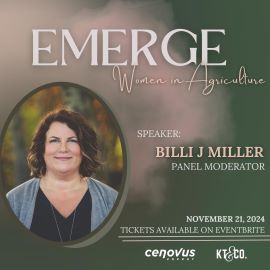

Beef TogethHER in Brandon, MB
Representing Manitoba Beef & Forage Initiatives, we are thrilled to announce Women in Beef: Building Positive Public Perception in Beef TogethHER, a networking event for women in beef production on January 22, 2025, following Ag Days. This engaging evening will feature a keynote on sharing your story to advocate for Canadian beef and opportunities to connect with peers. With the support of Manitoba Beef Producers and Ducks Unlimited, we’re excited to welcome 100-125 women to this inspiring event. Registration information below:

Financial and Marketing Literacy event in Renfrew, ON
As community advocate and organizers of Renfrew County’s 2023 TractHer event Angela, Keanan and Jennifer are passionate about empowering women in agriculture. Their upcoming event on February 5, 2025 will focus on financial and marketing literacy for local women entrepreneurs, featuring inspiring speakers, a catered meal, and opportunities to network and learn together.
Giv’her the Gears: Rabbit and Turtle Training Program in Summerside, PE
Presented by the PEI Ag Sector Council, Green Diamond Equipment and ASTA safety, offers tailored training for all skill levels, from beginners (Turtle Track) to advanced operators (Rabbit Track). Participants can join specialized cohorts focusing on equipment basics, implement operation, technology like GPS data use, troubleshooting repairs, and advanced driving techniques. Whether you're just starting out or ready to tackle complex challenges in the field, this program will help you build the skills and confidence you need.
Women in Hazelnut Farming: 1-Day Conference in Ontario
Join the Ontario Hazelnut Association and SCOR EDC for a one-day conference empowering women in Ontario to explore the potential of hazelnut farming, an emerging crop with growing global demand. Learn how to bring your crops to market, navigate government regulations, and harness the power of social media to boost sales. Featuring expert insights and a hands-on session with a guest speaker, this event will equip you with the knowledge and connections to succeed in this thriving industry.
Dollars & Sense in Shawville, QC
An afternoon of networking for Women in Agriculture on February 22, 2025 and learning by and for women working in the agricultural sector. The event will feature short presentations, workshops, and resources from both agricultural and non-agricultural professionals, offering valuable insights in a laid-back, supportive environment. With women often underrepresented in local agriculture, this initiative aims to build connections, reduce stress through better planning, and address the unique challenges they face. Keynote speaker: Karla Rahman of Ag Risk Managers.
Gather with other women in agriculture to get to the heart of your farm business, away from the overwhelm, isolation, and busy-ness of day-to-day operations. Learn more.
The Dairywomen's Summit in Agassiz, BC
It is an annual event dedicated to celebrating and empowering women in the dairy industry. Organized by West Coast Robotics, a Lely dealership. This summit serves as a platform for women to connect, share their experiences, and learn from one another. The event fosters a sense of community among dairywomen and industry partners and highlights their essential roles within the industry.
Survey

Shape the Future of Women in Agriculture! The Canadian Agricultural Human Resource Council is inviting you to take part in our survey. Results will be compared to those from 2015. Share your views on barriers to women’s advancement and help identify tools and strategies to empower women in leadership.
Together, we can measure progress and continue to move forward. Everyone is welcome to take it!
Take the 15-minute survey
Focus Groups
CAHRC is inviting you to participate in a focus group for the National Women in Agriculture & Agri-Foods Network Project. Your insights will help validate the action plan for a national organization dedicated to supporting women in agriculture, shaping its future direction and impact.
These sessions will provide a space for open discussion on the key priorities identified in the action plan and how they align with the needs of women in the industry.
Focus Group Sessions (via Zoom)
Atlantic (NB, PE, NS, NL): Feb 18 | 1:00 PM - 2:30 PM EST Registration Closed
Prairies (AB, SK, MB): Feb 20 | 2:00 PM - 3:30 PM EST Registration Closed
Central (ENGLISH): Feb 24 | 2:00 PM - 3:30 PM EST Register Here
Pacific (BC): Feb 27 | 11:00 AM - 12:30 PM EST Register Here
National (open to all): March 4 | 11:00 AM - 12:30 PM EST Register Here
Central (FRENCH): Mar 5 | 10:00 AM - 11:30 AM EST Register Here
Agri Women
Women play an important role in Canadian agriculture. Women working in the primary agriculture sector occupy positions in every industry from beef to beekeeping, from entry-level workers to farm owners.
But women have a bigger role to play. They make up 50 per cent of the general population, but only 30 per cent of the total agricultural workforce. And when we look at the proportion of women who go on to assume leadership roles, it is much smaller than the proportion of men who do so.
When women are not represented at the leadership and decision-making level, it hurts them and it hurts the entire industry. Numerous studies show that increasing gender diversity improves productivity, profitability, and retention. For the agriculture sector, which faces significant and increasing labour challenges in the coming years, increasing the proportion of women in the workforce at every level is crucial to success.
Promote women leaders in the workplace.
Strong leadership is essential to a thriving agricultural business. But many qualified and experienced women are not being given the support and recognition they need to assume leadership roles. As a result, women are underrepresented at the leadership level in agricultural businesses.
This doesn't just have consequences for the women themselves. The issue negatively impacts the entire agriculture sector, which needs strong leadership and diverse perspectives to enhance its profitability and competitiveness. In general, greater workplace diversity improves productivity and worker retention, and women-led companies tend to outperform the average financially.
Agricultural businesses need to do a better job of identifying, supporting, and promoting women with leadership potential. Addressing the issue begins with a recruitment process that encourages and values women applicants, and policies and processes that make training and advancement opportunities available to women employees.
Attract more women to your agricultural board.
Research shows that more women than men enroll in post-secondary education and participate in leadership programs, yet they are still underrepresented at the board level. As a result, women who are experienced, educated, committed, and have a valuable contribution to make are not getting the opportunity to make their voices heard.
This situation not only prevents women from achieving their full potential, it also diminishes the effectiveness of agricultural leadership as a whole. Boards with a more equal mix of genders are likely to make better decisions, achieve higher financial returns, and attract a wider range of talent.
To achieve greater gender diversity, boards must look at their current procedures and policies with a view to making them more inclusive of and welcoming to women candidates. By examining the codes of conduct, recruitment and selection processes, and other key elements of governance, organizations can start to build a more diverse and impactful board.
Best-Practice Guide to Enhancing Board Diversity
CAHRC has developed a free best-practice guide for industry association leaders, including CEOs, presidents, executive directors, and the board executive.
The guide includes policy templates, checklists, and step-by-step best practices for benchmarking and improving the inclusiveness of your board.
Workplace Diversity Tools
CAHRC supports workplace diversity by developing practical tools designed to help agricultural employers become an inclusive, supportive employer of choice.
The AGRI HR Toolkit addresses the unique needs of the agriculture industry and promotes an inclusive and diverse workplace environment. Based on extensive industry research and field testing, the toolkit includes everything agricultural employers need to improve their people-management skills and develop key resources to help them find, retain, and support employees.
Learn how to:
- Create a more accepting workplace
- Avoid discrimination and legal issues
- Attract a wider range of job applicants
- Develop a diversity program
- Identify hidden biases in the workplace
Diversity Reports
CAHRC commissions and contributes to reports and discussion papers that further the conversation about inclusion and diversity in agriculture. Publications include:
A Way Forward on Diversity and Inclusion
In October 2018, CAHRC hosted a forum to build on industry-wide conversations about increasing inclusion and diversity in Canadian agriculture. This discussion paper summarizes the recommended actions from this meeting.
Success in Agriculture: A Gendered Perspective of Social Networks
This study examines the social networks of individuals within the agriculture sector specifically as a way of understanding how social connections inform career progression.
Supporting the Advancement of Women in Agriculture: Needs Assessment
This report examines and addresses critical barriers to advancement facing women in the agriculture sector.
Options and Opportunities for Attracting Non-Traditional Workers to the Agricultural Industry (Report 1 of 3)
This report investigates opportunities and barriers to participation among three traditionally under-represented populations in the agricultural workforce. This report examines innovative approaches to increase agricultural employment among under-represented labour sources through an examination of 14 success case studies, and identifies common success criteria evident across 10 case studies. This report summarizes the activities associated with the pilot projects for increasing agricultural labour force participation among under-represented groups.
New Opportunities for Expanding the Agricultural Workforce Pilot Projects with Under-represented Groups (Report 2 of 3)
This report examines innovative approaches to increase agricultural employment among under-represented labour sources through an examination of 14 success case studies, and identifies common success criteria evident across 10 case studies.
Addressing Barriers to Agricultural Employment and Expanding the Agricultural Workforce Pilot Projects (Report 3 of 3)
This report summarizes the activities associated with the pilot projects for increasing agricultural labour force participation among under-represented groups.
Additional Resources
CAHRC recommends these resources to help agricultural employers and stakeholders learn to become more supportive of diversity in the sector.
Welcome to Black Canada: How to Take Action
This list of resources includes information and activities for people who want to learn more about the Black experience and actively support Black people in their communities.
Anti-racism Resources
This list includes articles, podcasts, videos, books, films, and social media accounts that serve as a resource to white people who wish to deepen their anti-racism work.
Structural Racism in the Food System: Perspectives from Black Women Scholars
Hosted by the Inter-Institutional Network for Food, Agriculture, and Sustainability (INFAS), this webinar features three Black women scholars from historically Black colleges and universities describe their unique perspectives on the issue of structural racism in the food system.
Reconciliation Canada
Born from the vision of Chief Dr. Robert Joseph, Gwawaenuk Elder, Reconciliation Canada is leading the way in engaging Canadians in dialogue and transformative experiences that revitalize the relationships among Indigenous peoples and all Canadians. Website includes reports, videos, and more.
National Centre for Truth and Reconciliation
This website contains statements, documents and other resources collected during a multi-year process to listen to Survivors, communities and others affected by the Residential School system.
The Together We Grow Coalition
Comprised of 45 agriculture industry, agribusiness, education and government members, the coalition was formed in 2016 with the goal of growing a diverse pipeline of talent—now and into the future—for the U.S. Agriculture industry.
“We are committed to working together to build a modern workforce with the capacity to meet the needs of a growing world. We will set an industry standard that values inclusiveness and diversity to ensure that the sector realizes its full potential.”
—Joint National Industry Statement on Commitment to Inclusion and Diversity
Indigenous Agriculture
First Nations and Indigenous people history in agriculture and agri-foods today has existed long before Canada confederated. There has always been a relationship between Indigenous people and the land. Indigenous people harvested plants, ranched livestock, and cultivated plants to create medicines and design companion planting systems like the Three Sisters[1]. Canada’s agriculture and agri-foods industry is critical to the sustainability and independence of the country, and of growing importance to Indigenous communities nationwide.
As part of our mandate to support human resource development in the sector, CAHRC continues to work on providing research, tools and understanding to support an equitable, inclusive and diverse workforce in primary agriculture.
An example of this work includes exploring with the Indigenous community ways to increase Indigenous participation in the agriculture population as operators and through employment. Another example includes conducting research focused on Indigenous farm management training to further support the development of agriculture and agri-food initiatives.
CAHRC continues to build relationships with Indigenous communities and producers through these initiatives.
Growing Security: Summary of Agriculture and Agri-foods Zoom Discussions
[1] Three Sisters companion planting – is a companion planting system where beans, corn and squash are planted together – each helps the other to survive. www.nativeseeds.org/blogs/blog-news/how-to-grow-a-three-sisters-garden
Sharing Circles - 2023 - CoP
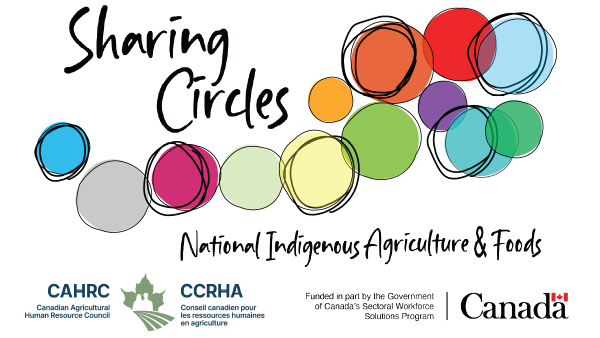
Register here: https://us06web.zoom.us/webinar/register/WN_ntiSy4MIThe3DBH74XYTgA
For the last two years, the Canadian Agricultural Human Resource Council has been co-hosting free online National Indigenous Agriculture and Food Sharing Circles (2021, 2022). These sessions offered a glimpse into how Indigenous people are leading and restoring cultural practices in agriculture. With Indigenous and industry experts sharing their experiences in agriculture, aquaculture, and traditional foods. The sessions offered both Indigenous and non-Indigenous participants an opportunity to learn more about Indigenous agricultural practices and facilitate connection and collaboration.
This year, CAHRC is continuing these sessions by providing further opportunities to promote the sharing of knowledge, the facilitation of connection and collaboration through our Communities of Practice, and training opportunities with best practices for Indigenous agricultural operations.
When Are The Sessions?
This year's sessions will be hosted online bi-weekly, starting Wednesday, November 22, 2023 and ending on March 6, 2024. The sessions are an hour long, from 12:00 to 1:00 pm ET
Who Should Attend?
The free sessions are open to all interested in growing Indigenous – First Nations, Métis and Inuit – practices and successes in Indigenous agriculture, harvesting and food packaging. Please share this invitation with others:
- Indigenous people, First Nations, Métis and Inuit and all Indigenous people
- Other Agriculture industry and government organizations, educational and health agencies
- Cross border Indigenous communities are welcome!
This Year's Topics:
- November 22, 2023 – Indigenous Youth in Agriculture – speakers share how Indigenous youth are reconnecting to the land through agriculture, farms, and STEM (Science Technology Engineering and Math).
- December 6, 2023 -An Agriculture and Foods Indigenous and Corporate Partnership – A Success Story – this story will speak on how they connected, what inspired and launched their partnership and what they are doing to plan for succession by Indigenous people.
- December 20, 2023 – Storing Fish & Other Foods – learn how Indigenous people are storing by canning, jarring, and smoking fish, and other foods.
- January 10, 2024 – Planting for Climate Change: Regenerative Agriculture – from the beginning of time, Indigenous peoples managed their lands to live in harmony and be abundant for future generations. Today, these for soil health and climate change through land management like permaculture, planting pollinators, and native plants.
- January 24, 2024 – Community Gardens – can promote food security and bring communities together. Learn how to start, key considerations, and the critical elements of keeping a community garden going.
- February 7, 2024 – Connecting & Supporting Indigenous Farming: The Role of Support Agencies – this session shares examples of how Indigenous and other agencies and funders support Indigenous and agriculture start-ups and expansion. Ask questions and make connections with these agencies.
- February 21, 2024 – Indigenous Practices in Harvesting and Foraging – discover safe practices of harvesting and foraging non-timber forest items like mushrooms and berries and honour our ancestors’ sustainable harvesting practices.
- March 6, 2024 – Indigenous Women in Agriculture Panel – women are entering the agriculture industry at faster rates than men. Be inspired by Indigenous women in farms and food production from across Canada.
Visit these links to view Sharing Circles of:
- 2021 – https://www.youtube.com/playlist?list=PLv48Uir6JVgrRbv7BUtk2-aBxHVU8E3E2
- 2022 – https://www.youtube.com/playlist?list=PLv48Uir6JVgrSdhV4P6FaOtGnAI_cZdBD
Register here: https://us06web.zoom.us/webinar/register/WN_ntiSy4MIThe3DBH74XYTgA
Please note that session dates and/or topics may change.
Sharing Circles - 2022 - How To
In fall 2022 CAHRC hosted a series of sharing circles with Indigenous and industry experts across Canada to learn more about Indigenous agricultural practices and facilitate an opportunity for connection and collaboration.
The 2022 sessions focused around "How To" covering topics such as composting, storage, greenhousing and community gardening, food labelling, and apiary.
You can watch these sessions here: https://www.youtube.com/playlist?list=PLv48Uir6JVgrSdhV4P6FaOtGnAI_cZdBD
Sharing Circles - 2021
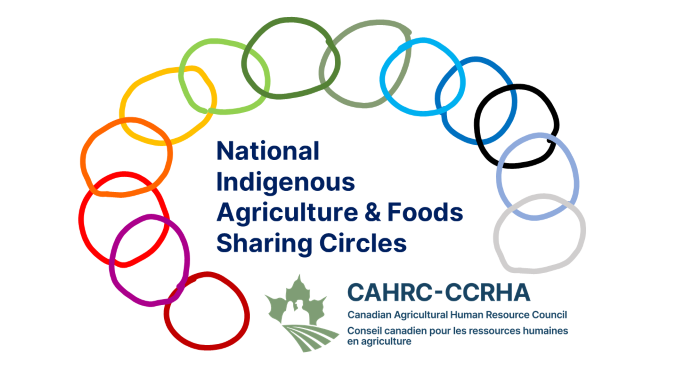
Learn how First Nations and Indigenous people are leading and restoring cultural practices in agriculture. Indigenous and Industry Experts share their experiences in agriculture, aquaculture and traditional foods. Sharing Circles are for anyone who is working in agriculture, community gardens or packaging/processing food products – or would like to learn more.
November-December 2021
November 9 - Community Agriculture and Gardening
November 16 - Livestock and Seafood
November 23 - Production, Marketing and Packaging
November 30 – Greenhouse Production
December 7 - Traditions, Processing & Storage
Facilitated by Kławum’ Paŧki (Beverley O’Neil), Citizen of Ktunaxa Nation / O'Neil Marketing & Consulting & Numa Communications
Non-traditional Agricultural Labour Sources
Supporting Canada's non-traditional agricultural labour sources.
Canada's agriculture sector faces unique challenges that impact its ability to attract and retain enough workers. In 2014, 26,400 jobs went unfilled in Canada's agriculture sector, costing $1.5 billion in lost revenues. The situation will worsen between now and 2025, by which time the agriculture sector's labour gap is expected to double.
With a growing need for labour of every type, including entry-level workers, managerial staff, specialists, and owner-operators, the sector must explore new options. By considering non-traditional labour sources and taking steps to support non-traditional labour in the workplace, the agriculture sector can improve its ability to find and keep the workers needed to support continued growth.
To this end, CAHRC commissioned a series of research reports that examine the potential of non-traditional labour sources, which include Indigenous people, immigrants, and persons with disabilities. The research explores some of the barriers that prevent these groups from joining the agricultural labour force, and identifies innovative approaches, new opportunities, and success criteria for increasing participation.
Options and Opportunities for Attracting Non-Traditional Workers to the Agricultural Industry
This report consolidates data research, focus-group findings, and an environmental scan of existing programs and services to identify Indigenous people, immigrants, and persons with disabilities as three sources of non-traditional labour with the potential to make a contribution to the agriculture sector labour force.
The report also identifies barriers to employment and options for addressing these barriers, and includes an overview of the input provided by focus groups conducted with employment services agencies that work with each of the three non-traditional labour sources.
New Opportunities for Expanding the Agricultural Workforce: Pilot Projects with Under-Represented Groups
Building on the research conducted in the March 2015 report, CAHRC commissioned three pilot project plans to expand the participation of Indigenous people, immigrants, and persons with disabilities in the agricultural workforce.
This report examines innovative approaches to increase agricultural employment among these labour sources through an examination of 14 success case studies, and identifies common success criteria evident across 10 case studies.
All 14 case studies, along with the case study interview template, are also included in this report.
Addressing Barriers to Agriculture Employment and Expanding the Agriculture Workforce Pilot Projects
This final report summarizes the activities associated with the pilot projects for increasing agricultural labour force participation among Indigenous people, immigrants, and persons with disabilities.
The contents include a summary of the research, consultation, industry validation, success case study development, and success criteria identification. The process for recruitment and selection of pilot project sites and the development of a hiring guide for target labour sources is also described.
The report includes an interim summative evaluation of the pilot projects, including outcomes, applicant perspectives, strengths and challenges of the projects, and lessons learned.
Summative Evaluation Report of the Researching Barriers to Agricultural Employment Pilot Projects
This report delivers a complete summative evaluation to assess the impact of the planning, implementation, and communication of the pilot projects.
The report also evaluates the performance of the pilot projects against intended goals and metrics, including the number of new hires from the three non-traditional labour sources targeted, including Indigenous people, immigrants, and persons with disabilities.
